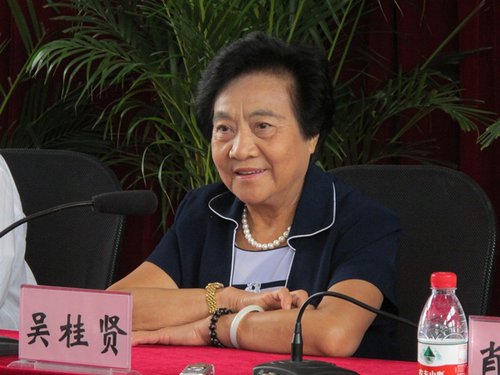China's First Female Vice Premier Fights to Reduce Poverty
 |
|
Wu Guixian served as China's first female vice premier from January 1975 to September 1977. [sxbjedu.com] |
Wu Guixian was born in 1938 in central China's Henan Province and at the age of 13 began working for a state-owned textile factory in west China's Shaanxi Province. She was appointed by Chairman Mao Zedong (1893-1976) as vice premier in 1975, becoming China's first and youngest female vice premier. After the reform and opening-up, she acted as chairperson and general manager of a textile corporation. Now retired, Wu is the president of the Association of Undeveloped Regions of Guangdong Province.
Fierce Work Ethic
In 1951, when she was 13, Wu began to work as a textile worker in a state-owned factory in Xi'an, capital of Shaanxi. Even at that early age, she displayed a fierce work ethic. She always arrived for work 45 minutes early and was the last to leave. Even after her colleagues had left, she remained at the factory, practicing her skills. She never requested time off.
Wu's husband, Wang Zhentao, worked in an army research institute and was in love with her for as long as six years before Wu consented to marry him. Preoccupied with her work, she was often too busy to spend time with him.
"I went to the marriage registration office alone with a note signed by Wu saying 'I agree to get married to Wang Zhentao', which surprised the staff there because people are usually required to show up in person to get married," Wang says. "The revolutionary committee in the factory where Wu was working gave a detailed explanation to the marriage registration office before I was able to get our marriage certificate."
Political Career
In 1969, Wu transitioned into a series of leadership roles when she became a member of the Central Committee of the Communist Party of China.
At that time Chairman Mao intended to promote some grassroots officials to manage state affairs and Wu matched the standards. She was assigned to prepare for the reconstruction of some government organizations damaged during the Cultural Revolution (1966-1976).
In 1975, Wu was elected as the Chinese vice premier, responsible for the Ministry of Health and the Textile Ministry. In her three years as vice premier, she focused on solving the problems faced by people in rural areas.
Venturing into Business
In 1988, Wu was invited to become the vice-general manager of a joint venture company of Hong Kong and mainland China focusing on textile, printing and dyeing and garment production in Shenzhen Economic Special Zone, south China's Guangdong Province.
At the beginning, the living conditions were so tough that Wu had to share a two-bedroom apartment with seven other colleagues. But in the end, the business prospered and Wu was able to retire in 1998. She then turned her attention to poverty alleviation.
Seeking Help for the Poor
"A while ago I went to Lisu Autonomous County in southwest China’s Yunnan Province and discovered that many children there still lack basic necessities like shoes and quilts," Wu said.
When she returned home, Wu enlisted the help of some entrepreneurs to donate 3,500 quilts to the children of Lisu.
In 2006, Wu began to pay close attention to the issue of poverty reduction when she traveled to Huining County in northwest China's Gansu Province. Despite being classified as a key national-level poverty-stricken county with dry climate and limited resources, the residents of Huining are also known for valuing education above all else, as education is the only way for them to shake off poverty.
In 2006, over 1,000 students in Huining were enrolled in universities, but many were so poor that they could not afford travel expenses. Wu launched a donation drive in Shenzhen to help raise money for them.
Wu continued her efforts in poverty alleviation, resulting in her being elected as chairperson of the Association of Undeveloped Regions of Guangdong Province, which was founded in 2010. The association aims to reduce poverty through industrial development. It establishes industrial bases in poverty-stricken areas and helps locals seek cooperation with leading enterprises and expand markets.
"I always conducted field investigations on-site to determine what sort of poverty alleviation schemes would be most suitable for a place," said Wu.
Wu's varied career, begun in a textile factory as a teenager and ending up in poverty alleviation, is a testament to the changing times in China.
"The reform and opening up has been so wonderful," Wu says. "Young people should make the most of all the opportunities that it offers and develop themselves and the country."
(Source: Global People/edited and translated by womenofchina.cn)
Please understand that womenofchina.cn,a non-profit, information-communication website, cannot reach every writer before using articles and images. For copyright issues, please contact us by emailing: website@womenofchina.cn. The articles published and opinions expressed on this website represent the opinions of writers and are not necessarily shared by womenofchina.cn.

 京公网安备 11010102004314号
京公网安备 11010102004314号